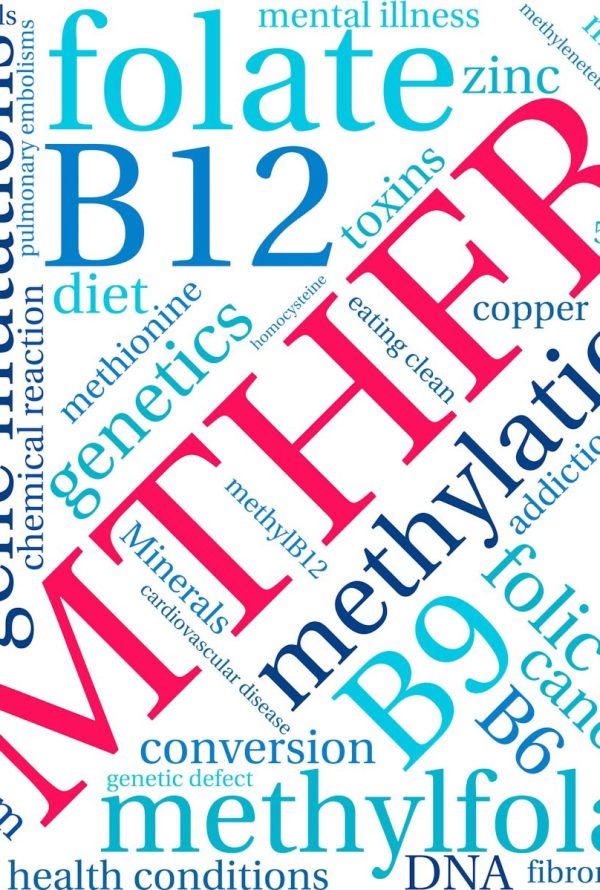
How do Environmental Chemical Exposures Affect Your Fertility?
15 Apr 2019
Can Naturopathy help with ‘Unexplained Infertility’?
30 Sep 2019
MTHFR
As a Natural Fertility practitioner my patients often tell me that they have “MTHFR” but don’t understand what it means, and question whether it has any relevance to their health and fertility.
Some say that they have tried to research it but get so confused and overwhelmed that they just give up.
In this blog, which is geared towards preconception, fertility, and pregnancy, I try to make “MTHFR” easier for you to understand.
What is MTHFR?
MTHFR (methylene tetrahydrofolate reductase) is an enzyme which is necessary for many important chemical reactions in the body.
One such reaction is the conversion of folate (naturally occurring folic acid in food e.g. green leafy veggies, legumes, eggs) into the active (more usable) form which is called 5-MTHF (5-methyltetrahydrofolate) – Vitamin B9.
Which Folic Acid supplement is right for you?
Most women today who want to get pregnant have been told that they need to make sure they have adequate folate levels for a healthy pregnancy. They are usually advised to take a folic acid supplement.
In my blog “Which Folic Acid Supplement to take for a Healthy Pregnancy?” I discuss the fact that supplemental folic acid is not the same as naturally occurring folate from food.
Naturally occurring folate in food is easily absorbed and converted into its active form, but this is not necessarily the case for supplemental folic acid.
I also mention that some women have ‘genetic variants’ that prevent the production of the enzymes required for the cascade of chemical reactions that eventually convert this folic acid into 5-MTHF.
In order to understand the importance of these particular chemical reactions, I need to explain a bit about genes…..
Genes, Heredity and Mutations.
Genes are made up of DNA. They are the basic units of heredity i.e. your genetic blueprint.
Genes are present in every cell of your body except red blood cells.
They provide your body with all instructions it needs to make proteins.
We all have two copies of every gene – one inherited from our biological mother and the other from our biological father.
Even though we all have the same number of genes, it’s the variation in the genes that give us our individual physical traits (eye/hair colour, height etc); as well as our individual biological functions.
The most obvious differences occur when there are serious genetic mutations which may arise in the reproductive process by accident or damage and can lead to miscarriage, birth defects or diseases.
What are Genetic Variants?
Unlike these genetic defects, less serious variations can occur in the sequencing of the smallest units that make up our DNA.
These variations are called SNP’s (single nucleotide polymorphisms). These SNP’s don’t automatically cause diseases and hence are not regarded as mutations.
They are known as ‘variants’ which can be amended with appropriate lifestyle and nutritional adjustments.
Is MTHFR important for making DNA?
The MTHFR gene provides the
instructions to make the enzyme MTHFR.
This enzyme is involved in many chemical reactions necessary for the body to properly use folate and hence transform various amino acids into specific proteins which are required for the formation of DNA, hormones, proteins and lipids.
What conditions are associated with an MTHFR variant?
- The inability to produce healthy levels of active folate – the demand for which increases dramatically during pregnancy and is involved in the production of DNA which is essential for foetal growth and development.
- Fertility problems, miscarriage, pre-eclampsia and pregnancy induced hypertension.
- Vitamin B12 deficiency. This vitamin is required for neurological function, red blood cell formation and DNA synthesis. It can only be utilized if MTHFR is functioning properly.
- Increased risk of blood clot formation especially during pregnancy.
- Depression, anxiety, psychiatric disorders.
- Vascular disease – high blood pressure, heart disease.
It’s important to know that the presence of an MTHFR SNP doesn’t necessarily mean you are at risk for any of the conditions I’ve mentioned here.
And as I said before, these variants can be amended with healthy lifestyle and nutritional adjustments.
How do MTHFR C677T and MTHFR A1298C affect fertility?
There are over 40 different variations (SNP’s) in the MTHFR genes.
The two most significant ones that have been discovered relating to health and fertility are known as MTHFR C677T and MTHFR A1298C.
Because we have one copy of each gene from each biological parent, we can have one or two variations/changes in either gene. One variation in either gene is referred to as ‘heterozygous’ for that SNP; and two changes in either gene is called ‘homozygous’ for that SNP.
Having the MTHFR SNP is actually very common – approximately 35-45% of the population have one SNP (heterozygous) and about 10% of the population have two SNP variations (homozygous).
MTHFR Gene testing
When couples see me for preconception care or fertility related issues, amongst the usual fertility related blood tests, I might also suggest a DNA/ Genomic test which will include the above mentioned MRHFR C677T and A1298C MTHFR variant tests as well as other fertility related variants to help me uncover the possible causes behind fertility issues. These results will help me tailor a personalised program to meet their specific needs.
I will then give them appropriate dietary and lifestyle advice, as well as essential supplements in their most active form (specific to the individual needs of each person) in order to help circumvent the issues that could possibly arise due to unaddressed MTHFR SNP variants.
Joanne Lipinski – Fertility Naturopath Melbourne
Joanne is a certified FitGenes practitioner and uses only those accredited, secure TGA registered DNA testing companies that produce accurate testing panels with sound research and evidence-based ratings.

